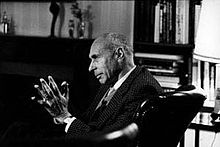Serge Fuster
- View a machine-translated version of the French article.
- Machine translation, like DeepL or Google Translate, is a useful starting point for translations, but translators must revise errors as necessary and confirm that the translation is accurate, rather than simply copy-pasting machine-translated text into the English Wikipedia.
- Do not translate text that appears unreliable or low-quality. If possible, verify the text with references provided in the foreign-language article.
- You must provide copyright attribution in the edit summary accompanying your translation by providing an interlanguage link to the source of your translation. A model attribution edit summary is
Content in this edit is translated from the existing French Wikipedia article at [[:fr:Casamayor]]; see its history for attribution. - You may also add the template
{{Translated|fr|Casamayor}}to the talk page. - For more guidance, see Wikipedia:Translation.

Serge Fuster (pen name "Casamayor"; 28 November 1911 in Algiers, French Algeria – 29 October 1988 in Paris ) was a French judge and writer. He wrote over twenty books, primarily essays on justice.
During World War II, in 1940, Fuster was a lieutenant in Sedan. When the war ended, Fuster participated in the Nuremberg Trials, as part of the French delegation, led by Edgar Faure and François de Menthon.
Beginning in the 1950s Fuster began writing for the journal Esprit under the nom-de-plume of "Casamayor", a name he would use for the next thirty years.
Fuster ended his judicial career as President of the Chamber at the Court of Appeal of Versailles. Upon his death, he was given many tributes, including ones by President François Mitterrand, Prime Minister Michel Rocard, and Justice Pierre Arpaillange.
Selected works
Non-fiction
- 1953 – "Où sont les coupables?" [Where are the culprits?]
- 1957 – "Les Juges" [The Judges]
- 1960 – "Le Bras séculier" [The secular arm]
- 1964 – "L'Homme, la Justice et la Liberté" [The Man, the Justice and Freedom]
- 1968 – "Combats pour la justice" [Fighting for Justice]
- 1969 – "Justice pour tous" [Justice for All]
- 1970 – "Si j'étais juge" [If I was a judge]
- 1972 – "L'Art de trahir" [The Art of betraying]
- 1973 – "La Police" [The Police]
- 1974 – "Questions à la justice" [Questions of justice]
- 1975 – "La Tolérance" [Tolerance]
- 1981 – "À vous de juger" [You be the judge]
- 1981 – "Intoxication" [Intoxication]
- 1983 – "Et pour finir… le terrorisme" [And finally... terrorism]
- 1985 – "Nuremberg : la guerre en procès" [Nuremberg the war on trial]
- 1986 – "L'Avenir commence hier" [The future begins today]
Fiction
- 1955 – "Saintejoie" [Holy joy]
- 1966 – "Le Prince" [The Prince]
- 1968 – "Désobéissance" [Disobedience]
- 1982 – "Mitia" [Mitya]










